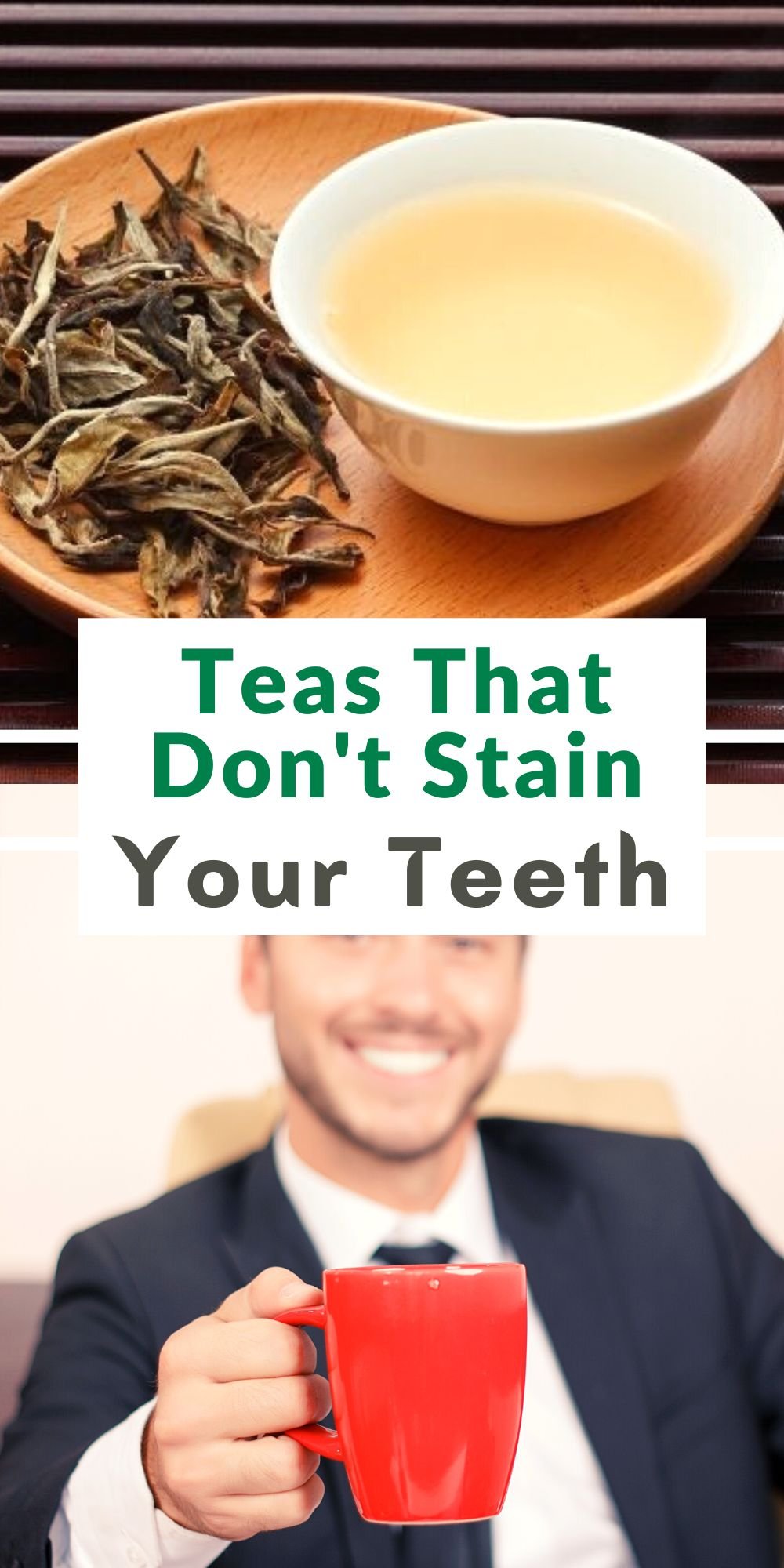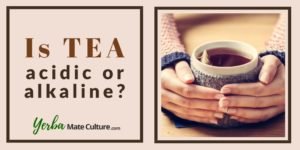As a tea lover, you probably don’t like the way that teas might stain your teeth.
Yes, a love for strong, dark tea can lead to a mouth full of yellowish teeth if you’re not careful about your habits. While tea staining is often subtle, regular tea drinking can cause discoloration over time.
Luckily, there are plenty of tasty teas that don’t stain teeth.
Let’s take a closer look at why some teas stain your teeth and others don’t. I will also introduce four healthy teas that you can drink regularly without worrying about teeth discoloring.
Finally, I’ll let you in on some effective ways to drink any tea with minimal staining.
Why Do Some Foods and Drinks Stain Teeth?
Some foods and drinks are worse than others when it comes to leaving a mark on your mouth. Staining from foods and drinks is usually caused by surface tooth discoloration.
However, it’s possible for some interactions to actually cause changes in your tooth material.
What Exactly Causes Tooth Stains?
There’s actually some science behind why certain foods stain teeth. It all comes down to factors like pigments and acidity. The most surprising thing is that even natural, healthy compounds in foods can be responsible for staining.
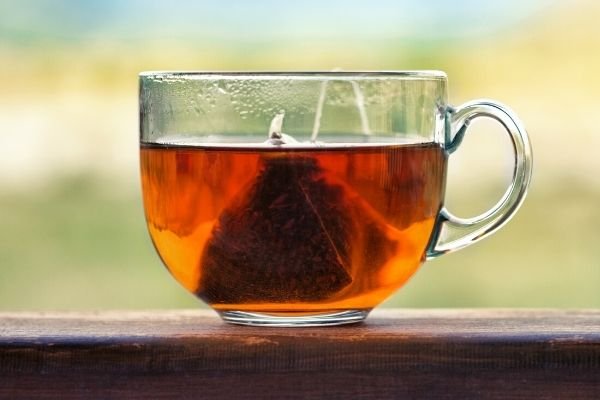
These three factors are mainly responsible for tooth stains related to foods and drinks:
Chromogens: Foods that contain pigmented compounds called chromogens are notorious for causing stains. Chromogens are high-pigment compounds that stick to enamel. They are found abundantly in healthy foods like grapes, blueberries, strawberries, raspberries, and blackberries. You’ll also find them in cherries and tomatoes. The most common chromogen-containing teeth-staining beverage is red wine. However, some teas contain potent amounts of chromogens.
Tannins: Many people drink black tea specifically because of the fact that it’s rich in tannins. Tannins are complex antioxidants that fight inflammation, protect against heart disease, fortify the brain, balance blood sugar and produce antibacterial effects. While tannins can leave a positive mark on your health, they are often responsible for staining because they enhance the ability of chromogens to stick to tooth enamel.
Acids: While the acids in foods and drinks don’t necessarily cause staining, they do create the perfect conditions for other compounds to cause staining. Acidic foods and drinks soften and erode enamel to create “rough patches” that allow pigment from foods and beverages to cling to teeth. While sodas, sports drinks, and alcoholic beverages are the worst offenders, many teas are also mildly acidic.
Black tea can stain your teeth because it’s acidic and contains plenty of tannins and chromogens.
Types of Tooth Stains
Here are the common teeth discoloration categories:
Extrinsic Staining
An extrinsic stain is a surface tooth stain. Superficial in nature, an extrinsic stain occurs when pigmented residue from foods and beverages leaves behind stain particles. Those particles create a film protein that encapsulates your tooth enamel to create a dull, yellowed look.
The most common causes of extrinsic teeth stains are coffee, tobacco, and some teas. The good news is that extrinsic stains usually respond well to simple tactics like regular brushing, routine dental appointments, and whitening toothpastes.
Intrinsic Staining
Occurring below the surface, intrinsic staining is a more severe form of staining than extrinsic staining. It happens when staining particles penetrate through the tooth’s surface to accumulate within the tooth’s enamel.
The good news for tea lovers is that intrinsic staining isn’t necessarily tied with beverages like tea or coffee.
However, you may be at greater risk for intrinsic staining as a tea drinker if you’re not brushing regularly. While intrinsic tooth staining can be more difficult to remove, both professional and at-home whitening solutions can often take care of the problem.
Age-Related Staining
Time, weakening enamel, and prolonged exposure to stain-inducing residue can all contribute to age-related staining. As we age, the dentin that acts as the tooth’s core tissue begins to naturally have a more yellowish color. Enamel also thins out with age.
This combination allows the yellowing dentin to actually show through the tooth’s enamel. People who are consuming “staining” foods and beverages are simply more likely to see age-related yellowing.
4 Teas That Don’t Stain Teeth
Fortunately, there are some teeth-friendly teas for you to enjoy. These teas are naturally free of the tannins and acidity that set the stage for staining.
Here are some of the best teas to drink if you don’t want to stain your teeth:
Ginger Tea
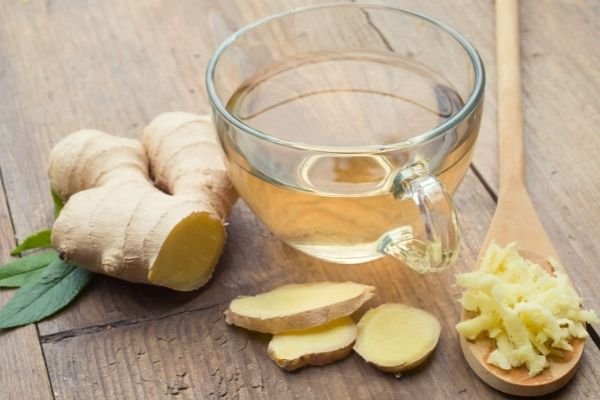
Tangy and tasty, ginger tea won’t stain your teeth. It doesn’t contain any tannins and it’s not acidic. In fact, the lack of acidity is what makes ginger such a popular tea for soothing stomach issues.
Ginger tea is one of the healthiest herbal teas and offers many benefits including:
- Digestion: Stimulates the production of bile and saliva and can be used to relieve irritable bowel syndrome (IBS), acid reflux, and heartburn.
- Nausea: Great home remedy for nausea and treating a hangover.
- Colds and Cough: Contains antioxidants that can boost your immunity. Ginger tea is also great for a cough and sore throat.
- Migraine and Headaches: Ginger can be as effective as common drugs used for treating migraine headaches.
- Pain and Stiffness: Has anti-inflammatory compoundsthat can help reduce the pain and stiffness caused by osteoarthritis.
White Tea
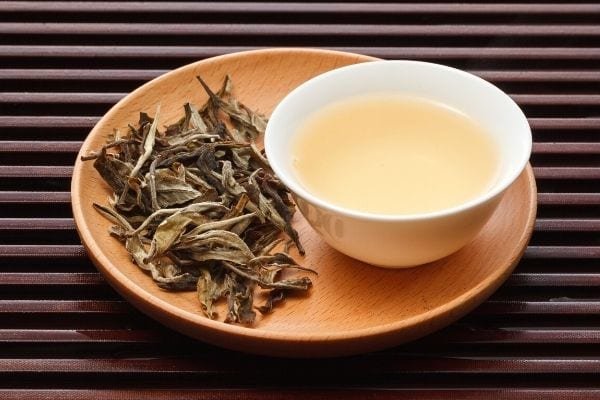
If you are looking for a “real tea” (made from the tea plant) that doesn’t cause teeth staining, then white tea is my recommendation.
Like ginger tea, white tea is not acidic and contains very low levels of tannins. It’s actually known to protect teeth by fighting off bacteria and cavities.
White tea benefits include:
- Weight Loss: Helps boost your metabolism and burn an additional calories daily.
- Cardiovascular Health: May lower risk of heart disease and lower blood pressure.
- Skin and Teeth: Supports the collagen network that keeps skin youthful and contains polyphenols that inhibit the growth of harmful bacteria in the mouth.
- Brain Protection: The polyphenols in white tea may help prevent Parkinson’s and Alzheimer’s disease.
- Cancer Prevention: Can help prevent the growth of cancer cells.
Rooibos Tea
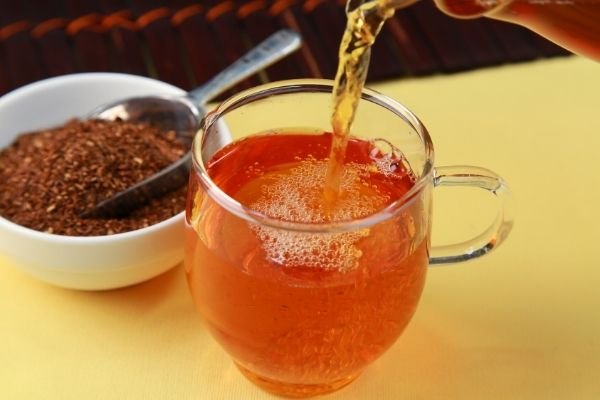
Rooibos tea doesn’t cause teeth discoloration because its tannin level is very low. In addition, it has a neutral (or very slightly acidic) pH level.
Rooibos tea has many science-backed health benefits:
- Allergies: Has natural antihistamines that may prevent allergic symptoms from triggering.
- Cholesterol: Quercetin found in rooibos has anti-inflammatory properties that can help increase good cholesterol prevent the effects of bad cholesterol.
- Blood Pressure: Can help with keeping blood pressure at optimal levels by mitigating cardiovascular diseases and atherosclerosis.
- Skin Health: Contains alpha hydroxy acid and zinc which promote healthy skin.
- Digestion: Has a relaxing effect on the digestive system and can relieve stomach pain and symptoms of diarrhea.
Greek Mountain Tea
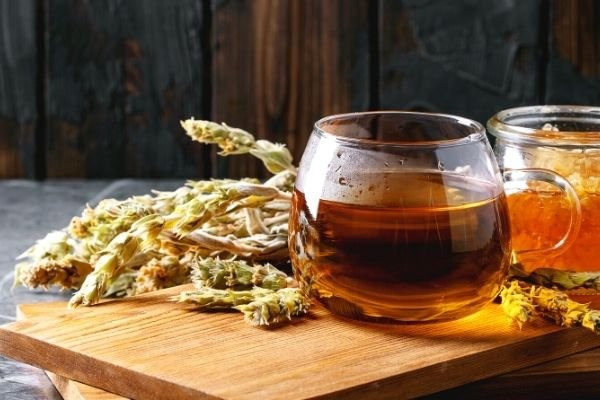
Greek mountain tea, sometimes called ironwort or Shepherd’s Tea, is a herbal tea that the ancient Greeks used as an all-purpose remedy.
Made with the Sideritis plant, it lacks tannins and has a neutral or alkaline pH level so you don’t have to worry about staining your teeth.
The benefits of Greek mountain tea include:
- Nutrients: Contains iron and beneficial flavonoids with powerful anti-inflammatory, anti-microbial, and antioxidant effects.
- Immunity: Has anti-viral and anti-microbial properties and strenghthens the immune system.
- Digestion: Often enjoyed after a meal, Greek mountain tea stimulates gastric secretions and aids digestion.
- Blood Pressure: May help with lowering blood pressure by relaxing blood vessels.
SWEET TIP:
Research suggests that manuka honey can kill harmful bacteria in the mouth and help prevent plaque.
Check out my guide with the best manuka honey brands to make a cup of tea that is super good for your teeth.
How to Prevent Tea From Staining Your Teeth
Even if you like to drink teas or other drinks that can stain your teeth, there are some ways to minimize discoloration.
Add Milk: The casein in milk actually creates a buffer that helps to prevent tea-induced staining. A study from 2014 found that adding milk to tea was as effective as vital bleaching treatments.
Reduce Contact With Teeth: When we drink from a cup, liquid washes over the teeth before it is swallowed. Try to minimize contact with teeth when enjoying your tea. You can even consider using a stainless-steel straw when sipping tea.
Gargle With Water After Drinking Tea: Rinsing your teeth with pure water immediately after drinking tea can help to remove tannins and chromogens from their surface.
Brush Regularly: Always brush your teeth twice per day — every morning and evening. This helps prevent the chromogens from permanently sticking to your teeth. Consider using a whitening toothpaste.
Tea and Teeth Stain FAQ
Can you drink tea after brushing teeth?
It’s better to drink tea first and then brush your teeth after that, but not right away. If you drink tea that is acidic it can soften the enamel and you should wait at least 30 minutes before brushing.
Does herbal tea stain teeth?
Some herbal teas are acidic and contain tannins and chromogens. These herbal teas, including hibiscus, rosehip, and blackcurrant tea, can cause teeth discoloration over time. Some herbal teas like ginger and rooibos tea don’t stain your teeth.
Does peppermint tea stain teeth?
Peppermint tea contains tannins and can promote teeth stains. However, peppermint tea is not acidic so it’s not as bad as some other options like black tea.
Does white tea stain teeth?
White tea is not acidic and has a very low level of tannins so it doesn’t stain your teeth.
Final Thoughts on Enjoying Teas That Don’t Stain Teeth
Tea isn’t necessarily the worst offender when it comes to staining teeth. However, the elements in some teas can cause staining over time if you’re a regular tea drinker.
The easiest option is to simply switch to ginger tea, white tea, or other teas that don’t stain teeth.
You can also use some little tricks that include adding milk to tea, sipping tea with a straw, and rinsing your mouth after drinking tea. All of them can help to prevent staining even if a cup of strong black tea is your daily delight!
Save on Pinterest:
